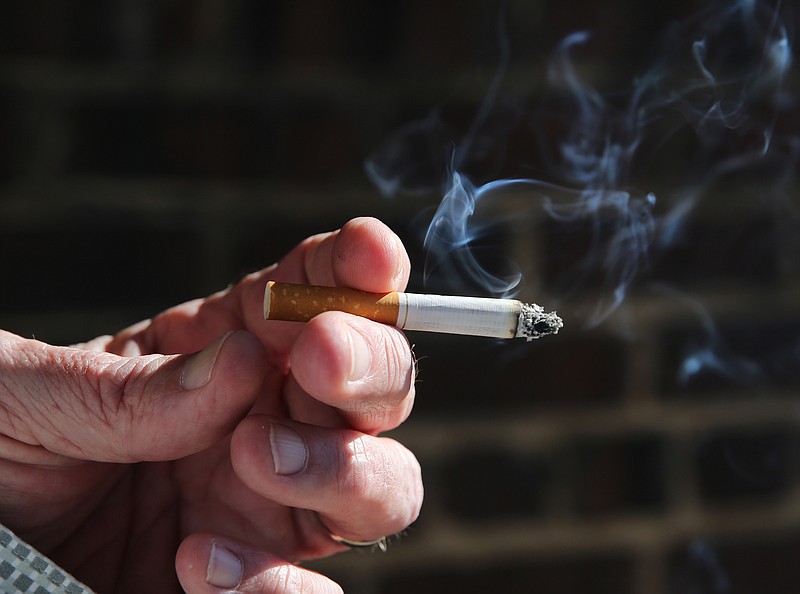Georgia has the nation's third-lowest tobacco tax, but a new bill could raise it above the national average as lawmakers seek ways to raise revenue while lowering the medical costs associated with cigarette smoking.
The bill would raise the state's tobacco tax from $0.37 per pack to $1.87. Thirty seven states have a tax of $1 or more, and the national average is $1.81 per pack.
Kasey Carpenter, R-Dalton, a member of the Ways and Means Committee where House Bill 731 was introduced, said even though it would raise a substantial amount of revenue, he doesn't think the bill has a good chance of passing this year.
"I don't think there's an overwhelming desire to increase the tax, at least in the Republican Caucus," Carpenter said. "There are some folks that are interested in it, but not the guys that I'm talking to."
As the Georgia Legislature looks for ways to increase state revenues, raising the tobacco tax could make a substantial difference. It also could help the state save money in medical costs.
In a report on the governor's preliminary budget by the Georgia Budget and Policy Institute, it was estimated that Georgia spends about $3.18 billion a year on medical costs associated with cigarette smoking, including an estimated $650.4 million in Medicaid spending.
Danny Kanso, a tax and fiscal policy analyst with the institute, wrote in the report that the state's tobacco tax is one of Georgia's revenue streams showing the weakest growth rate. It was down 3.6% from the previous fiscal year, with only $111 million raised over the first six months of that period.
Kanso said that by raising the cigarette tax by $1.50, Georgia would save an estimated $12.27 million in fewer lung cancer cases and $28.11 million in fewer heart attacks and strokes in the next five years.
Andy Freeman, government relations director for Georgia's American Cancer Society, said there is a lot of interest from lawmakers in raising the tobacco tax, especially as the state wrestles with substantial budget cuts Gov. Brian Kemp has called for.
"It's simple math really," Freeman said. "Using tobacco products will get you sick and kill a lot of people. By simply changing that habit, you're cutting down on health care costs across the state. That's what we're trying to accomplish.
"Although the governor's budget projects relatively low revenue growth of about 3% in 2020 and 2% the following year, the state of Georgia could significantly increase tobacco revenues by relinquishing its status as a regional outlier while taking an important step to improve public health," Kanso wrote.
At a speaking event in Jacksonville, Florida, U.S. Surgeon General Jerome Adams said the percentage of people who smoke is higher in states that have lower tobacco taxes.
"We know one of the most effective things you can do to lower the rate of smokers is to increase the cost," Adams said.
Freeman said that message from the top health official in the country speaks volumes and Georgia lawmakers should pay attention to it.
Carpenter said he would be hesitant to increase the tobacco tax because it could financially hurt border communities such as Dalton and others in Northwest Georgia.
"When we increased the gas tax [in 2015], that hurt local businesses that bordered other states," he said. "Those gas taxes hurt the convenience stores and a tobacco tax could do the same."
Carpenter said a higher tobacco tax in Georgia would entice smokers to buy across state lines. Tennessee has a $0.62 tax and Alabama has a $0.68 tax.
"That will hurt Georgia's businesses," he said.
Freeman doesn't look at an increase of the tobacco tax like other taxes.
"Some people are opposed to raising all taxes. This is more a user fee than an actual tax," he said. "For example, I don't smoke so I'm not contributing to that tax."
While an increase to the tobacco tax is still up in the air, Carpenter said a bill that would tax electronic cigarettes and vaping will happen.
"I don't think there's any doubt that will happen this year," he said. "We want to make sure there's a level playing field. We have a lot of tobacco producers in Georgia and just want to make it fair."
Freeman said that won't have as much of an impact as taxing tobacco, but it's a start and would affect a different population.
"Cotton candy flavors are not designed for 55-year-old white men," he said.
Gov. Brian Kemp has called for a 4% budget cut this fiscal year and a 6% cut next fiscal year. In this budget session, testimony from department heads has involved how cuts will affect their departments, work forces and effectiveness.
Georgia lawmakers voted this week to take a hiatus until Feb. 18 to work through how to manage the proposed $28 billion budget. Committees will still meet, but General Assembly sessions are on recess so lawmakers can dig deeper into the governor's budget and take time to understand how proposed cuts will affect taxpayers.
Lawmakers could decide to look closer at the tobacco tax as the session rolls on.
Contact Patrick Filbin at pfilbin@timesfreepress.com or 423-757-6476. Follow him on Twitter @PatrickFilbin.

